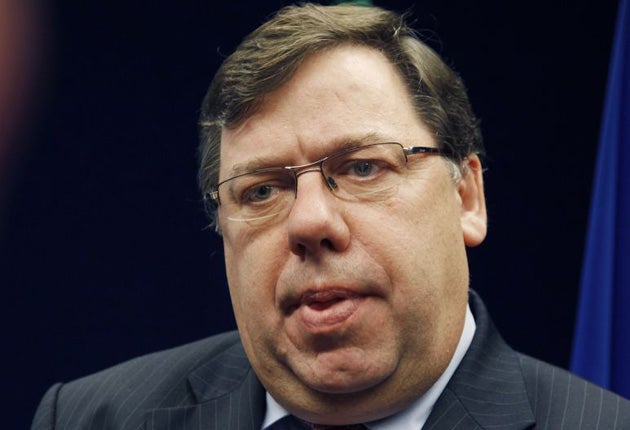Brian Cowen feels the effects of 'drunken' interview

Your support helps us to tell the story
From reproductive rights to climate change to Big Tech, The Independent is on the ground when the story is developing. Whether it's investigating the financials of Elon Musk's pro-Trump PAC or producing our latest documentary, 'The A Word', which shines a light on the American women fighting for reproductive rights, we know how important it is to parse out the facts from the messaging.
At such a critical moment in US history, we need reporters on the ground. Your donation allows us to keep sending journalists to speak to both sides of the story.
The Independent is trusted by Americans across the entire political spectrum. And unlike many other quality news outlets, we choose not to lock Americans out of our reporting and analysis with paywalls. We believe quality journalism should be available to everyone, paid for by those who can afford it.
Your support makes all the difference.The Irish Prime Minister is battling for his political survival following a radio interview in which he was widely judged to be the worse for wear after late-night drinks. Political murmurings about Brian Cowen, which began with that episode last week, persisted yesterday as the question remained high on the political agenda.
Mr Cowen has signalled that he is determined to stay on, and no cabinet ministers in the ruling Fianna Fail/ Green party coalition have broken cover to declare that he should go. But the standard ministerial declarations of support for the embattled Taoiseach have sometimes been accompanied by admissions, pitched as being more in sorrow than anger, that the incident has inflicted damage on an already deeply unpopular government.
Last night Mr Cowen gave an unexpected press briefing where he insisted he was not "on probation" as speculation over his leadership reached fever pitch. He declared that Fianna Fail was united behind him.
"I'm not a Taoiseach on probation," he said. "I'm the elected leader of our party. I've got the full support of my government colleagues."
Mr Cowen's performance in last week's interview was not strikingly shocking, but the fact that he gave a national radio interview at 9am, after drinking with journalists and others till after 3am, was viewed as particularly bad judgement. At one point he referred to the "Croke Park agreement", a key element of the government's economic strategy, as the "Good Friday agreement". He later said sorry but rejected suggestions that he was either drunk or hungover adding: "It wasn't my best performance and I would like to apologise for that. There was no suggestion of disrespect or casualness on my part."
The most obvious backbench sign of disenchantment came yesterday from former minister of state Tom Kitt, who declared: "The time has come to move on to new leadership. Heads are down a bit and we do need to do something about it in the days ahead."
It is not clear how much of Fianna Fail's grassroots agree with Mr Kitt, who no doubt feels a particular freedom to speak out since he was sacked by Mr Cowen several years ago. But party backbenchers are anxious that Fianna Fail's opinion poll showing is at a historic low, and many of them are in danger of losing their seats.
The most obvious candidate to replace Mr Cowen is his Finance Minister Brian Lenihan, who is probably the most popular and respected politician in the Irish Republic. He – rather than Mr Cowen – is given most of the credit for whatever success the government has had in coping with its deep economic problems.
Mr Lenihan, who joined Mr Cowen at his press briefing last night, has remained scrupulously loyal to the Prime Minister, saying adamantly that there is no vacancy for the job. Nonetheless, many in Fianna Fail would welcome his promotion.
The major complication is that Mr Lenihan was diagnosed late last year with pancreatic cancer. After receiving radiotherapy and chemotherapy he said this month that his cancer had stabilised and posed "no clear or immediate danger" to him. The party faces a delicate task in choosing between a politician with a health problem and another who has little chance of winning an election.
Mr Cowen's standing is so low that widespread surprise was evident a month ago in Ireland when he was included in a list of 10 international leaders who "have managed to win serious respect", chosen by Newsweek. The reaction verged on the incredulous that a Prime Minister with a personal standing of less than 20 per cent should be rated so highly abroad.
Join our commenting forum
Join thought-provoking conversations, follow other Independent readers and see their replies
Comments